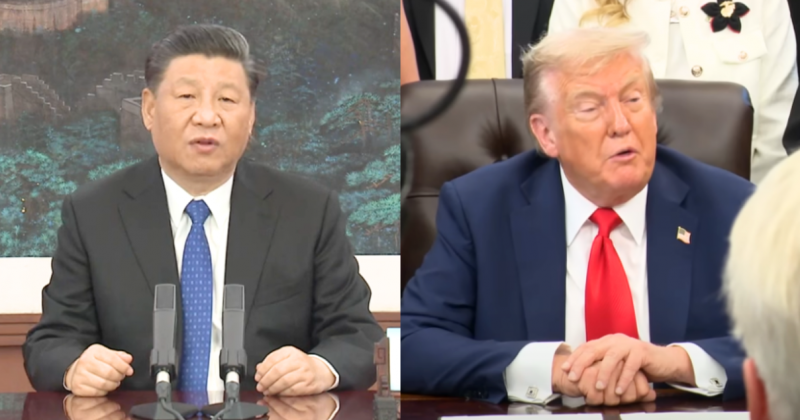Chinese President Xi Jinping made an unexpected quip about security backdoors while gifting smartphones to South Korean President Lee Jae Myung, creating a moment of levity during an otherwise tense week of trade negotiations involving President Donald Trump.
The exchange occurred in South Korea, where Xi traveled to meet Trump on the sidelines of the Asia-Pacific Economic Cooperation summit.
Xi presented a pair of Xiaomi Corp. smartphones to Lee during their encounter.
Video footage that spread across social media platforms captured Lee asking a pointed question: “Is the line secure?”
Xi responded with laughter, gesturing toward the devices while speaking through an interpreter: “You can check if there’s a backdoor.”
Both leaders erupted in laughter at the remark.
American lawmakers have consistently raised concerns that Chinese technology companies such as Huawei Technologies Co. may incorporate backdoors into their equipment or services.
These backdoors would theoretically provide unauthorized access to sensitive data. However, the companies in question have repeatedly denied these allegations.
Washington officials have discussed implementing similar access points or tracking technology into American products, including Nvidia Corp. chips.
The US company has publicly opposed such measures.
The gift exchange appeared to benefit Xiaomi financially.
Bloomberg reported the company’s shares increased by as much as 4.4 percent in Hong Kong on Monday. Electric vehicle sales data partially supported this rise.
The outlet further noted that retail investors have historically rushed to purchase stock in companies that Xi or other senior Chinese officials mention or highlight during public appearances. This pattern has created predictable market movements following such events.
The Asia-Pacific Economic Cooperation summit brought together multiple world leaders for discussions on trade and regional cooperation. Media outlets reported that Trump’s presence added complexity to the proceedings given ongoing trade tensions.
WATCH:
It was reported that Trump and Xi appeared to reach a breakthrough agreement at the summit.
The deal promised progress on tariffs, massive soybean purchases and commitments to combat the flow of fentanyl precursor chemicals into the United States.
The agreement came after a high-profile face-to-face meeting between the two leaders.
During their summit, Xi struck a conciliatory tone, telling Trump that “China and the US should be partners and friends.”
He added that “this is what history has taught us and what reality demands.”
Trump’s team celebrated what they characterized as significant concessions from Beijing. The administration pointed to specific commitments on trade issues that have long been priorities for Washington, particularly regarding agricultural exports and the opioid crisis.
The apparent goodwill, however, evaporated within 24 hours.
Xi used his closing remarks at the summit to deliver what observers interpreted as a direct attack on American trade policy.
Speaking to business leaders at the conference, Xi positioned China as a defender of free trade. He issued a warning to regional partners about aligning with American efforts to reduce dependence on Chinese supply chains.
“APEC economies should oppose protectionism, resist unilateral bullying and prevent the world from returning to the law of the jungle,” Xi declared.
Experts widely viewed the statement as aimed squarely at Trump’s approach to international trade, the Daily Mail reported.
Brent Sadler, a former military diplomat with extensive experience in Asia, characterized Xi’s remarks as both calculated and revealing.
He suggested the Chinese leader was responding to Trump’s assertive stance during their private meeting.
“Trump very clearly set the stage for this meeting, flexing his position,” Sadler said.
“What we saw after the summit was Xi returning to familiar rhetoric. It wasn’t hostile, but it wasn’t friendly. It was more of a cold, businesslike engagement, and Xi was clearly sending a message.”
Sadler went further in his analysis, describing Xi’s comments as “catty.”
He interpreted the speech as containing an implicit threat to other nations in the region.
“It wasn’t just a swipe; it was almost like a threat,” Sadler explained.
“Xi was telling others not to side with the Americans, which is a strategic move to reinforce China’s influence in the region.”
According to Sadler, the episode demonstrates the fundamental nature of US-China relations. Rather than a genuine partnership, the relationship consists of complex and tense negotiations where both countries pursue long-term strategic objectives.
The pattern of promises followed by disappointment has occurred before.
The previous trade agreement between the United States and China collapsed just months after implementation.
“I have seen this movie before,” Sadler said.
“Promises from Beijing have often been made, but not followed through on. We’ll see if this time is any different.”
Regional analysts expressed skepticism about whether China would follow through on its commitments.
Particular doubts centered on Beijing’s ability to deliver on fentanyl control measures and export restrictions.
“The US needs to ensure China adheres to its commitments,” Sadler stated.
“The handshake deal in South Korea is only meaningful if it’s followed up with action. Trump’s team needs to keep the pressure on.”
A former senior Biden administration official pointed to a concerning detail about the agreement. No text of a joint statement or formal document was ever released to the public.
“President Xi has been willing to push back against Trump, so I could see him changing terms of the deal if Trump posts something in the middle of the night on X with an entirely new policy,” the former official said.
The next scheduled summit between Trump and Xi is expected to take place in April.
That meeting will likely determine whether the current agreement represents genuine progress or merely another temporary understanding.
A White House aide responded to Xi’s comments by emphasizing that the United States also maintains a long-term strategic perspective on the relationship.
“We’re a threat to them, too… I think we get along very well, and I think we can be bigger, better and stronger by working with them as opposed to just knocking them out,” the official said, according to Daily Mail reporting.

